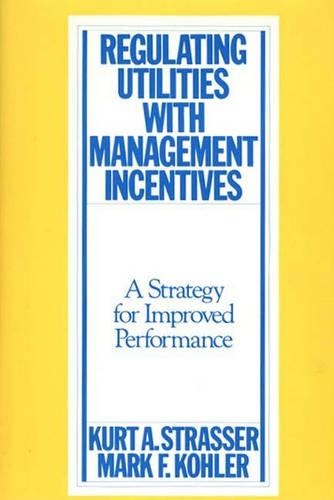
Regulating Utilities with Management Incentives: A Strategy for Improved Performance
(Hardback)
Publishing Details
Regulating Utilities with Management Incentives: A Strategy for Improved Performance
By (Author) Mark Kohler
By (author) Kurt A. Strasser
Bloomsbury Publishing PLC
Praeger Publishers Inc
11th December 1989
United States
Classifications
Tertiary Education
Non Fiction
338.473636
Physical Properties
Hardback
206
Description
This book proposes a new approach to the government regulation of utilities. Arguing that traditional command-and-control regulation does not encourage efficient performance, Strasser and Kohler advocate the use of an incentive-based regulatory system and offer a practical, realistic strategy for the successful implementation of such plans within the context of utility regulation. The analysis is supported by a comprehensive survey of the relevant legal materials, an overview of the literature on organization theory and institutional economics, and a survey of the latest thinking on how incentives can most effectively be paid. Strasser and Kohler begin by identifying problems associated with current regulatory techniques, demonstrating that disincentives are often built into the regulatory system. When that system has tried incentives, the authors show they have been applied in an ad hoc manner, further exacerbating the problem. In presenting the case for incentive-based regulation, the authors review the history of comprehensive incentive plans, look at what organization theory can teach us about using incentives as a regulatory strategy, and explore the effective use of incentive compensation by nonregulated companies. Strasser and Kohler then develop a strategy for implementing incentive plans in regulated utilities, showing that, in order to work, the plans must include the installation of clearly defined bonuses and penalties, specific standards of performance, the payment of bonuses to managers rather than shareholders, and reliable and complete measures of company performance. Policymakers, economists, public utility regulators, and attorneys involved in the complex arena of utility regulation will find Regulating Utilities with Management Incentives indispensable reading.
Reviews
Analyzes the problem of motivating regulated utilities to perform efficiently. Focuses on three major themes: traditional regulation creates some disincentives to efficient operation, ' incentives, rather than command-and-control, are the regulatory strategy needed to motivate better performance, ' and the development of a strategy for designing and implementing incentive plans.' Draws on theories of organizational behavior as well as examples of operating incentive structures to facilitate the analysis. Strasser is a professor of law at the University of Connecticut School of Law, Kohler is a law clerk in the U.S. Court of Appeals for the Second Circuit.-Economic Books Current Selections
"Analyzes the problem of motivating regulated utilities to perform efficiently. Focuses on three major themes: traditional regulation creates some disincentives to efficient operation, ' incentives, rather than command-and-control, are the regulatory strategy needed to motivate better performance, ' and the development of a strategy for designing and implementing incentive plans.' Draws on theories of organizational behavior as well as examples of operating incentive structures to facilitate the analysis. Strasser is a professor of law at the University of Connecticut School of Law, Kohler is a law clerk in the U.S. Court of Appeals for the Second Circuit."-Economic Books Current Selections
Author Bio
KURT A. STRASSER is Professor of Law at University of Connecticut School of Law and has published articles in the fields of public utilities and antitrust policy. MARK F. KOHLER is a member of the Connecticut Bar and law clerk to the Honorable Thomas J. Meskill, U.S. Court of Appeals for the Second Circuit.
